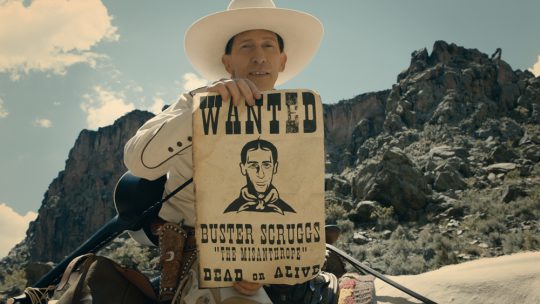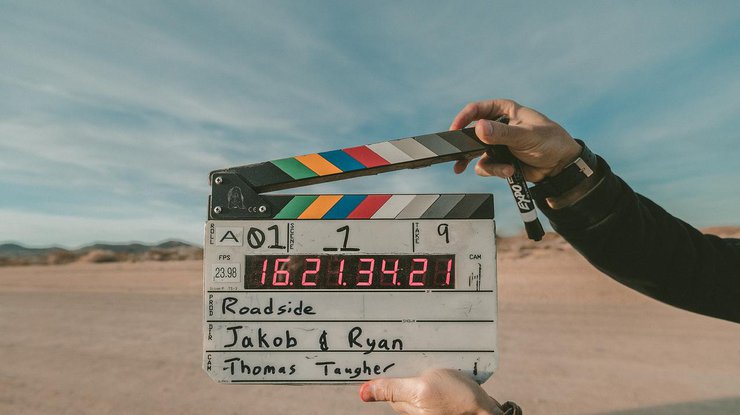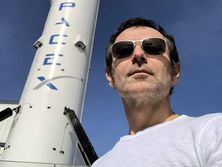The Future of the Future | Последние новости сегодня в мире культуры
The Future of the Future

Tamino: The new Sound of the Nile?

The singer and grandson of celebrated Egyptian star Moharam Fouad on mixing his European upbringing with his middle eastern roots.
2018-12-06 16:05:48
Blackfishing: The women accused of pretending to be black

Newsbeat speaks to two influencers accused of blackfishing and looks at why its so controversial.
2018-12-06 16:05:38
Katie Price: The ups and downs of her life

From a £1million wedding to narrowly escaping bankruptcy - the Pricey has had a turbulent life and career.
2018-12-06 16:05:22
RuPaul’s Drag Race coming to BBC Three in 2019

The global reality TV hit will be on the hunt for a new Queen of Great Britain.
2018-12-05 12:35:43
BBC drops plans for Brexit TV debate between May and Corbyn

The broadcaster offered to air a debate, but Labour had criticised the proposed format.
2018-12-05 01:35:18
Cromer Pier a star of BBC One this Christmas

Cromer appears in BBC One idents before programmes and a short film about spending time with family.
2018-12-05 01:07:05
Pinsel.AR – проект, который поможет в 3D разглядеть скульптуры гениального Иоанна Пинзеля

2018-12-04 19:05:25
Легендарная Бет Харт подарит украинцам пикантную смесь блюзовых баллад и зажигательного рока

2018-12-04 17:35:28
Turner Prize 2018: Film-using art activists in the running

Video and film dominate the shortlist for this years prize, whose winner is announced later.
2018-12-04 13:36:16
Бэнкси разыграет в онлайн-лотерее новую скульптуру, деньги пойдут на помощь беженцам

2018-12-04 08:53:27
George H.W. Bush Service Dog Sully to Join Walter Reed Hospital

2018-12-04 05:36:33
YouTube top earners: The seven-year-old making $22m

An American boy who reviews toys is this years highest-earning YouTube star, according to Forbes.
2018-12-03 22:05:34
2018 WAFCA Winners

As a film critic of medium-low importance, one of my most sacred duties is participating in the Washington Area Film Critics Association (WAFCA) year-end awards extravaganza. During this hallowed time of year, I watch dozens of movies and mine my own recollection of the good, the bad, and the ugly to determine what, precisely, the best films of the year were. At the end of this grueling process—this death march through endless stacks of DVDs, searching for the rarest pearl in an ever-increasing sea of muck—we WAFCA members nominate up to five films/people in each category. The five films/people who earn the most votes in every category are then voted upon by the whole of the membership, the winners are chosen, the press release is sent out, and blessed, blessed relief descends upon us as we put the exercise to rest for 11 months.
2018-12-03 18:07:03
PewDiePie in battle with T-Series to keep top YouTube spot

PewDiePie is battling Indian channel T-Series in a bid to remain the YouTuber with the most subscribers.
2018-12-03 15:36:30
Победители премии M1 Music Awards 2018: известны имена лучших исполнителей Украины

2018-12-02 11:35:18
Группа Друга ріка показала свое будущее в новом клипе на песню Дождь/ Пусть умоет нас: видео

2018-12-01 12:05:31
Кузьменко: Мы с Парнаса устали взирать, как испитые братские рожи лезут в Киев музоны лабать

2018-12-01 01:08:59
После отмены концерта в Краснодаре рэпер Хаски устроил выступление на улице, стоя на крыше автомобиля, его задержали и дали 12 суток ареста

2018-11-30 22:34:44
Смерть работает на любовь: как делали и когда покажут фильм о путешествиях режиссера Кантера

2018-11-30 22:05:10
Take That have fastest-selling album of 2018 so far

Howard Donald, Gary Barlow and Mark Owens greatest hits tops the UK chart on its first week of release.
2018-11-30 20:06:52
Tamino: The new Sound of the Nile?

The singer and grandson of celebrated Egyptian star Moharam Fouad on mixing his European upbringing with his middle eastern roots.
- 2018-12-06 16:05:48
Blackfishing: The women accused of pretending to be black

Newsbeat speaks to two influencers accused of blackfishing and looks at why its so controversial.
- 2018-12-06 16:05:38
Katie Price: The ups and downs of her life

From a £1million wedding to narrowly escaping bankruptcy - the Pricey has had a turbulent life and career.
- 2018-12-06 16:05:22
RuPaul’s Drag Race coming to BBC Three in 2019

The global reality TV hit will be on the hunt for a new Queen of Great Britain.
- 2018-12-05 12:35:43
BBC drops plans for Brexit TV debate between May and Corbyn

The broadcaster offered to air a debate, but Labour had criticised the proposed format.
- 2018-12-05 01:35:18
Cromer Pier a star of BBC One this Christmas

Cromer appears in BBC One idents before programmes and a short film about spending time with family.
- 2018-12-05 01:07:05
Pinsel.AR – проект, который поможет в 3D разглядеть скульптуры гениального Иоанна Пинзеля

- 2018-12-04 19:05:25
Легендарная Бет Харт подарит украинцам пикантную смесь блюзовых баллад и зажигательного рока

- 2018-12-04 17:35:28
Turner Prize 2018: Film-using art activists in the running

Video and film dominate the shortlist for this years prize, whose winner is announced later.
- 2018-12-04 13:36:16
Бэнкси разыграет в онлайн-лотерее новую скульптуру, деньги пойдут на помощь беженцам

- 2018-12-04 08:53:27
George H.W. Bush Service Dog Sully to Join Walter Reed Hospital

2018-12-04 05:36:33
YouTube top earners: The seven-year-old making $22m

An American boy who reviews toys is this years highest-earning YouTube star, according to Forbes.
- 2018-12-03 22:05:34
2018 WAFCA Winners

As a film critic of medium-low importance, one of my most sacred duties is participating in the Washington Area Film Critics Association (WAFCA) year-end awards extravaganza. During this hallowed time of year, I watch dozens of movies and mine my own recollection of the good, the bad, and the ugly to determine what, precisely, the best films of the year were. At the end of this grueling process—this death march through endless stacks of DVDs, searching for the rarest pearl in an ever-increasing sea of muck—we WAFCA members nominate up to five films/people in each category. The five films/people who earn the most votes in every category are then voted upon by the whole of the membership, the winners are chosen, the press release is sent out, and blessed, blessed relief descends upon us as we put the exercise to rest for 11 months.
- 2018-12-03 18:07:03
PewDiePie in battle with T-Series to keep top YouTube spot

PewDiePie is battling Indian channel T-Series in a bid to remain the YouTuber with the most subscribers.
- 2018-12-03 15:36:30
Победители премии M1 Music Awards 2018: известны имена лучших исполнителей Украины

- 2018-12-02 11:35:18
Группа Друга ріка показала свое будущее в новом клипе на песню Дождь/ Пусть умоет нас: видео

- 2018-12-01 12:05:31
Кузьменко: Мы с Парнаса устали взирать, как испитые братские рожи лезут в Киев музоны лабать

- 2018-12-01 01:08:59
После отмены концерта в Краснодаре рэпер Хаски устроил выступление на улице, стоя на крыше автомобиля, его задержали и дали 12 суток ареста

- 2018-11-30 22:34:44
Смерть работает на любовь: как делали и когда покажут фильм о путешествиях режиссера Кантера

- 2018-11-30 22:05:10
Take That have fastest-selling album of 2018 so far

Howard Donald, Gary Barlow and Mark Owens greatest hits tops the UK chart on its first week of release.
- 2018-11-30 20:06:52
Что будем читать?













































































